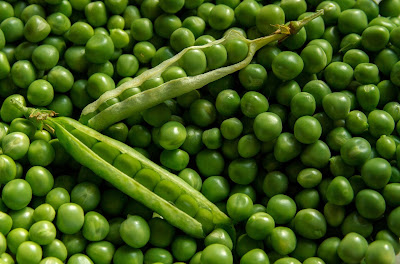Peas are a versatile and nutritious legume that have been consumed for thousands of years. They are widely cultivated in many parts of the world and are used in a variety of culinary applications, from soups and stews to salads and side dishes. In this blog post, we will explore the description, nutrition, health benefits, and frequently asked questions about peas.
Description:
Peas are a member of the legume family, which includes beans, lentils, and peanuts. They are a cool-season crop that can be grown in a variety of soil types, but they prefer well-drained soils with a pH of 6.0 to 7.5. Pea plants typically grow to be 1 to 2 feet tall and produce pods that contain one to nine seeds. The seeds can be eaten raw or cooked and come in a variety of colors, including green, yellow, and purple.
Nutrition:
Peas are a nutrient-dense food that is rich in vitamins, minerals, and fiber. A one-cup serving of cooked peas (160g) contains approximately:
- Calories: 125
- Protein: 8g
- Carbohydrates: 22g
- Fiber: 8g
- Fat: 0.6g
- Vitamin A: 34% of the recommended daily intake (RDI)
- Vitamin C: 134% of the RDI
- Vitamin K: 48% of the RDI
- Folate: 25% of the RDI
- Iron: 17% of the RDI
- Magnesium: 12% of the RDI
- Potassium: 8% of the RDI
- Zinc: 7% of the RDI
Peas are also a good source of plant-based protein and contain all nine essential amino acids. Additionally, they are high in antioxidants, which help protect against cellular damage caused by free radicals.
Health Benefits:
Improved Digestive Health: Peas are high in fiber, which can help promote regular bowel movements and prevent constipation. The fiber in peas can also help feed the beneficial bacteria in the gut, which can improve overall digestive health.
Reduced Risk of Chronic Diseases: The high antioxidant content in peas can help protect against chronic diseases, such as heart disease, diabetes, and cancer. Peas are also low in fat and sodium, which can help lower the risk of developing these diseases.
Improved Immune Function: Peas are a good source of vitamin C, which is essential for a healthy immune system. Vitamin C helps stimulate the production of white blood cells, which are responsible for fighting off infections and illnesses.
Reduced Inflammation: Peas contain anti-inflammatory compounds, such as flavonoids and carotenoids, which can help reduce inflammation in the body. Chronic inflammation has been linked to a variety of diseases, including arthritis and heart disease.
FAQs:
Q: Are peas high in carbohydrates? A: Yes, peas are relatively high in carbohydrates, but they are also high in fiber, which can help slow the absorption of carbohydrates and prevent spikes in blood sugar levels.
Q: Can I eat peas if I am trying to lose weight? A: Yes, peas can be a great addition to a weight loss diet. They are low in fat and calories but high in fiber and protein, which can help keep you feeling full and satisfied.
Q: Can I eat raw peas? A: Yes, you can eat raw peas, but they are more commonly cooked or steamed. Raw peas can be added to salads or used as a crunchy snack.
Q: Are peas a good source of protein? A: Yes, peas are a good source of plant-based protein and contain all nine essential amino acids.




No comments:
Post a Comment